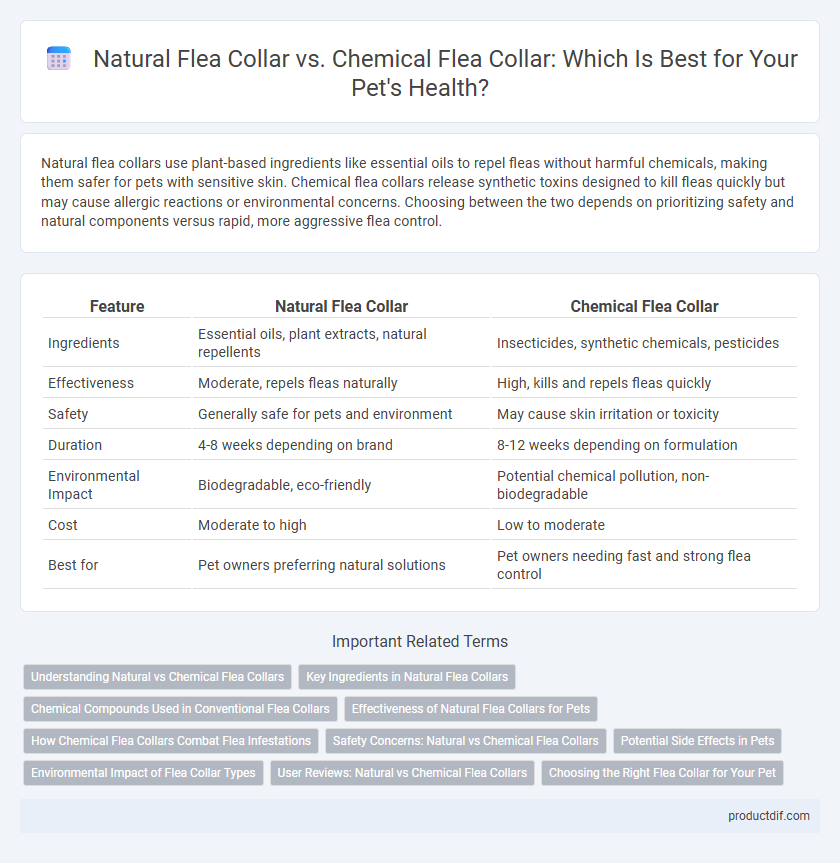Natural flea collars use plant-based ingredients like essential oils to repel fleas without harmful chemicals, making them safer for pets with sensitive skin. Chemical flea collars release synthetic toxins designed to kill fleas quickly but may cause allergic reactions or environmental concerns. Choosing between the two depends on prioritizing safety and natural components versus rapid, more aggressive flea control.
Table of Comparison
| Feature | Natural Flea Collar | Chemical Flea Collar |
|---|---|---|
| Ingredients | Essential oils, plant extracts, natural repellents | Insecticides, synthetic chemicals, pesticides |
| Effectiveness | Moderate, repels fleas naturally | High, kills and repels fleas quickly |
| Safety | Generally safe for pets and environment | May cause skin irritation or toxicity |
| Duration | 4-8 weeks depending on brand | 8-12 weeks depending on formulation |
| Environmental Impact | Biodegradable, eco-friendly | Potential chemical pollution, non-biodegradable |
| Cost | Moderate to high | Low to moderate |
| Best for | Pet owners preferring natural solutions | Pet owners needing fast and strong flea control |
Understanding Natural vs Chemical Flea Collars
Natural flea collars use herbal and essential oil extracts such as citronella, cedarwood, and peppermint to repel fleas without harmful chemicals, making them safer for pets with sensitive skin or allergies. Chemical flea collars contain synthetic insecticides like permethrin or imidacloprid that kill fleas effectively but may cause side effects such as irritation, toxicity, or environmental harm. Choosing between natural and chemical flea collars depends on balancing effectiveness, pet health, and ecological impact.
Key Ingredients in Natural Flea Collars
Natural flea collars contain key ingredients such as essential oils from citronella, cedarwood, lavender, and eucalyptus, known for their insect-repellent properties. These collars often incorporate herbal extracts like neem and lemongrass, which provide a safer, non-toxic alternative to synthetic chemicals. The blend of natural oils and plant-based compounds works synergistically to repel fleas while minimizing risks to pets and the environment.
Chemical Compounds Used in Conventional Flea Collars
Conventional flea collars commonly use chemical compounds such as imidacloprid, flumethrin, and tetrachlorvinphos to effectively repel and kill fleas and ticks on pets. These synthetic chemicals work by disrupting the nervous system of parasites, providing long-lasting protection but sometimes causing sensitivity or allergic reactions in pets. Understanding the chemical composition helps pet owners weigh the benefits and potential risks when choosing between natural and conventional flea collars.
Effectiveness of Natural Flea Collars for Pets
Natural flea collars utilize essential oils and plant-based ingredients like citronella, cedarwood, and neem to repel fleas effectively without harmful chemicals. These collars provide a safe alternative by targeting flea behavior rather than killing them instantly, offering long-lasting protection for pets with sensitive skin. Studies show that natural flea collars can reduce flea infestations by up to 70%, making them a viable option for pet owners seeking eco-friendly pest control.
How Chemical Flea Collars Combat Flea Infestations
Chemical flea collars combat flea infestations by releasing insecticides such as pyrethroids or organophosphates, which disrupt the nervous system of fleas, leading to paralysis and death. These collars provide continuous protection for up to eight months by slowly dispersing chemicals that spread over the pet's fur and skin, killing fleas and preventing new infestations. Effective against a wide range of parasites, chemical flea collars also target ticks and mites, offering comprehensive pest control for pets.
Safety Concerns: Natural vs Chemical Flea Collars
Natural flea collars made with essential oils and plant-based ingredients generally pose fewer health risks and are safer for pets with sensitive skin or allergies compared to chemical flea collars, which often contain synthetic pesticides like permethrin or carbaryl. Chemical collars can cause irritation, neurological issues, and toxicity if ingested or improperly used, raising significant safety concerns among pet owners. Choosing a natural flea collar reduces the likelihood of adverse reactions while still providing effective protection against fleas and ticks.
Potential Side Effects in Pets
Natural flea collars often contain essential oils like citronella or neem, which tend to have lower toxicity and fewer side effects such as skin irritation or allergic reactions in pets. Chemical flea collars typically use neurotoxic ingredients like pyrethroids or organophosphates, which may cause symptoms ranging from mild itching and redness to severe neurological issues or systemic toxicity, especially in sensitive or small animals. Pet owners should carefully consider the potential risks and consult a veterinarian to select the safest and most effective flea prevention method tailored to their pet's health needs.
Environmental Impact of Flea Collar Types
Natural flea collars often use biodegradable materials and plant-based repellents, reducing harmful residues and pollution in the environment. Chemical flea collars typically contain synthetic pesticides like deltamethrin or permethrin, which can persist in soil and water, posing risks to wildlife and aquatic ecosystems. Choosing natural options supports eco-friendly pest control and minimizes toxic exposure for pets and surrounding habitats.
User Reviews: Natural vs Chemical Flea Collars
User reviews highlight that natural flea collars are favored for their eco-friendly ingredients and minimal skin irritation, appealing to pet owners seeking safer, chemical-free options. In contrast, chemical flea collars receive mixed feedback, praised for their rapid effectiveness but criticized for potential allergic reactions and stronger odors. Overall, consumer experiences underscore a trade-off between natural product safety and chemical collars' faster action in flea control.
Choosing the Right Flea Collar for Your Pet
Natural flea collars made from essential oils like citronella or eucalyptus offer a safer alternative for pets with sensitive skin, providing effective flea repellent without harsh chemicals. Chemical flea collars contain active ingredients such as imidacloprid or flumethrin, delivering faster flea and tick elimination but may pose risks of irritation or toxicity if misused. Selecting the right flea collar depends on your pet's health, age, and allergy status, along with consulting a veterinarian to ensure optimal protection and safety.
Natural flea collar vs Chemical flea collar Infographic

 productdif.com
productdif.com